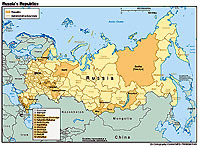Faith of Russians in omens and astrology is declining – poll

(Interfax – March 17, 2013) Russians have been losing interest in the supernatural over the years, sociological studies indicate.
Whie in 2000 57 percent of respondents admitted that they believe in omens and 52 percent in prophetic dreams, last February the figures dropped to 52 percent and 43 percent respectively, Interfax was told at Levada Center that conducted a special study of the subject.
Belief in omens is more inherent in women (61 percent), young people under 25 (62 percent), people with a higher education (55 percent) and residents of Moscow (70 percent) than the average person while prophetic dreams have a special meaning for women (55 percent), people aged 25-40 (48 percent), with a secondary education (46 percent) and living in Moscow (57 percent).
However, presently only 28 percent of respondents believe astrologers while in the past the degree of confidence was at 33 percent. Even fewer Russians believe that aliens visit the Earth from time to time: 26 percent now compared to 31 percent in 2000.
Astrological predictions are trusted by women (36 percent), young people under 25 (38 percent), with a secondary education (34 percent) living in cities with a population of 100,000-500,000, while aliens are expected more frequently by people aged 25-55 (28 percent), with a secondary education (33 percent) living in Moscow (41 percent).
Over the years the number of Russians believing in eternal life has contracted from 21 to 17 percent even though at least a half of the population in Russia claims to belong to some religion.
“The decline in the interest in supernatural can be sooner accounted to the fact that lately the mass media have been paying less attention to the subject,” Oleg Savelyev, a sociologist from Levada Center, said.
In his opinion, at the beginning of perestroika when the unofficial taboo on the subject was lifted, the media paid excessive attention to it.
“After the demand was satisfied, the number of shows and articles about the supernatural clearly declined and as interest waned, so did faith in the extraordinary,” the sociologist said.
Savelyev said some 20 percent of the respondents admitted that over the past six years they used the services of fortune-tellers, magicians and healers for occult purposes with varying frequency (80 percent did not).
Out of those who used such services 21 percent said their problems were always resolved, 32 percent said they were never resolved, and 47 percent admitted that help was only occasional.
